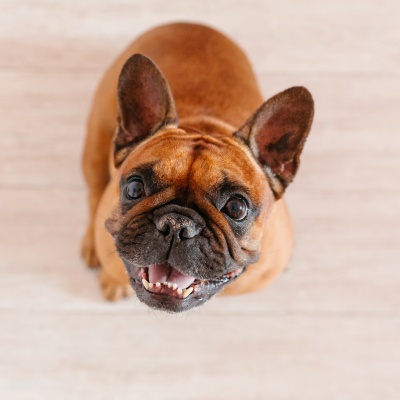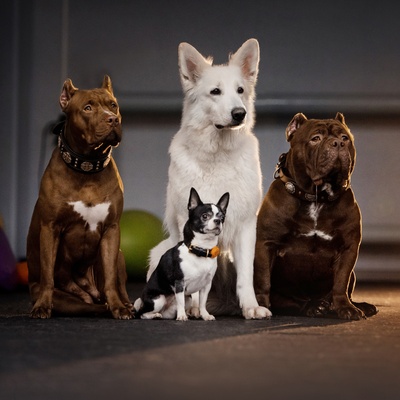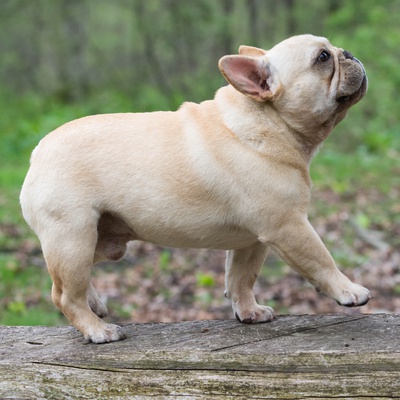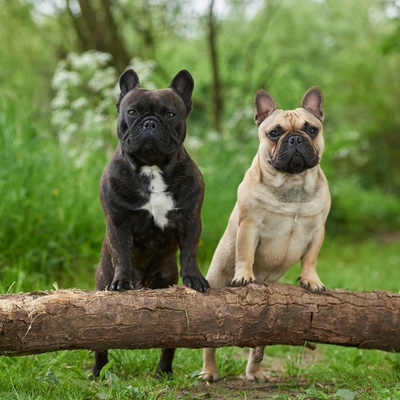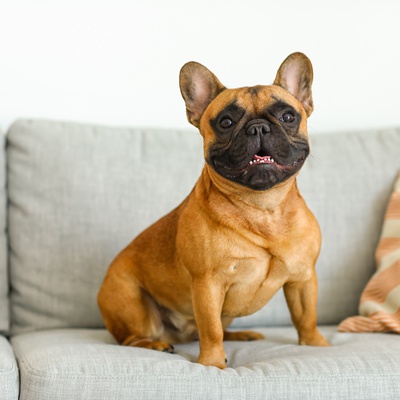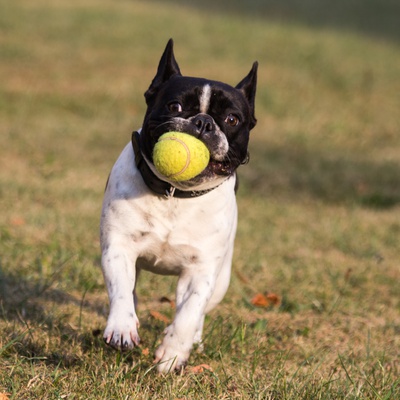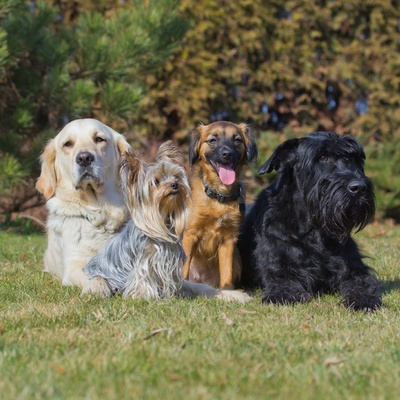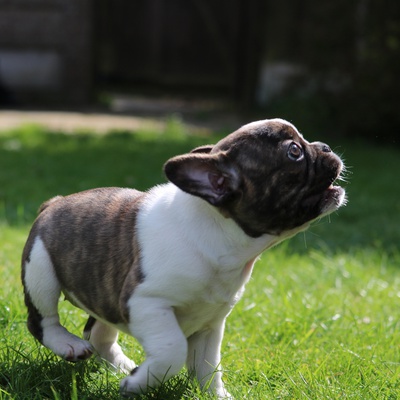Introducing the French Bulldog
Find out everything you need to know about the French Bulldog: its characteristics, its behaviour, its training and how much one costs.
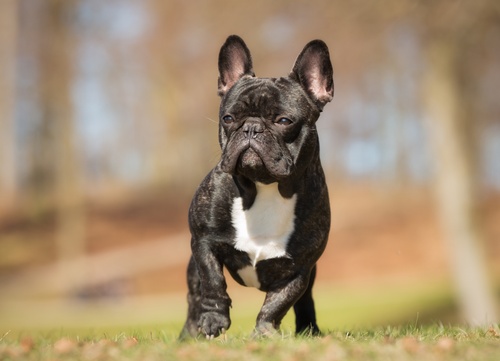
Find out everything you need to know about the French Bulldog: its characteristics, its behaviour, its training and how much one costs.
Originating from England but gaining immense popularity in France, the French Bulldog's ancestry is closely intertwined with toy bulldogs from the past. Today, this breed stands proudly as one of the most adored and popular dog breeds globally. These compact, muscular dogs have shown their versatility and adaptability in various fields, be it as delightful lap companions, watchdogs, or show ring competitors.
The French Bulldog's nature is nothing short of affectionate, loyal, and endearing. They are known to form strong bonds with their families, always seeking attention and love. With their sociable disposition and loving demeanor, a French Bulldog ensures that your days are filled with playful antics and heartwarming cuddles.
This section outlines the unique features of the French Bulldog breed.
The French Bulldog, a group 9 companion and toy dog, is cherished for its affectionate nature and unique look.
The French Bulldog stands at 11-12 inches and weighs 16-28 pounds, making them a compact and sturdy companion.
French Bulldogs have a short, smooth, and fine coat, making them relatively low maintenance in terms of grooming.
French Bulldogs have varied coat colors, from brindle to fawn and cream. Their charming look can be highlighted by white markings and patches.
French Bulldogs suit city life, thriving in apartments with regular play. Their size fits both small spaces and large homes, provided they're kept cool.
French Bulldogs bond closely with families, are child-friendly, and sociable with pets. Their playful nature makes them beloved companions.
French Bulldogs, with their flat faces, may face issues like brachycephalic syndrome and hip dysplasia. Regular check-ups promote their well-being.
French Bulldogs are eager to learn with consistent, positive reinforcement. For outdoor training, a Weenect GPS tracker ensures you always track your playful companion.
We can help!
Every dog has its own character, and so do you. Making the right choice will ensure his well-being and yours.
Take our quiz to find out which breed is right for you, based on your personality, lifestyle, location and many other criteria.
Don't wait any longer and take the quiz to find out the answer!
The "Frenchie" is a compact, robust dog with a sleek coat, bat-like ears, and an expressive face that easily captivates hearts.
The French Bulldog is a smaller breed, but don't let that fool you! Females stand between 10 and 11 inches, while males can reach up to 12 inches.
In terms of weight, female French Bulldogs typically weigh between 16 and 24 pounds, with males ranging from 20 to 28 pounds.
The growth of a Frenchie puppy is quite moderate. While they might start off small, by the age of 5 months, they can weigh up to 12 pounds. By the time they celebrate their first birthday, most French Bulldogs will have reached their full height, but may continue filling out in weight and muscle until they're about 18 to 24 months old.
The French Bulldog boasts a smooth, short coat that lies flat against the body. Their coat is remarkably fine and delicate, requiring minimal grooming, which makes it perfect for those who appreciate a low-maintenance canine companion.
The coat colour of the French Bulldog is quite varied. Recognized colours include brindle, fawn, white, and combinations thereof. Some might also display a pied pattern, where a primarily white coat is marked with patches of another colour. It's essential to note that while these are the primary accepted colours, the breed can occasionally showcase other unique and beautiful shades.
The French Bulldog has a short coat with a soft undercoat. Fortunately, their grooming requirements are relatively minimal compared to long-haired breeds. While French Bulldogs do shed, it's not excessive, and regular shedding occurs throughout the year. Given the shortness and fineness of their hair, brushing them once a week with a soft bristle brush is usually sufficient to remove loose hairs and keep their coat looking its best.
The French Bulldog’s coat, being short and sleek, does not easily trap dirt, meaning they don’t need frequent baths. Bathing every 2-3 months or as needed (if they get into something messy) is typically adequate for this breed. However, given their skin folds, it's crucial to ensure these areas are kept clean and dry to prevent infections or irritations.
The French Bulldog exudes an appearance of balance and robust proportions. Their head is distinctive, being square and large, with a flattened forehead and a short snout. They have expressive, round eyes, typically in a dark hue, that radiate charm and curiosity.
Positioned high on the head, their signature "bat ears" stand erect, giving them a unique and endearing silhouette. Their compact body showcases a solid, muscular build, which is surprisingly agile for their stout size. And while they lack the long tails seen in many other breeds, their short, slightly curved tail is equally characteristic.
The French Bulldog is a true companion. With a loyal, playful, and affectionate nature, they are cherished by families and individuals alike.
Presently, there are around 400 distinct dog breeds, classified into 10 groups based on their shared characteristics and functions.
The French Bulldog falls under group 9, which comprises companion and toy dogs. This group is diverse, featuring breeds such as the Bichon Frise, Chihuahua, and Shih Tzu, among others. Breeds in this category are primarily known for their amiable nature, adaptability to city living, and their role as beloved companions rather than workers. Renowned for their endearing personalities and little size, they are often chosen by people living in urban environments due to their manageable size and low exercise needs.
The French Bulldog is often described as a small dog with a big heart. Radiating a warm and welcoming aura, these dogs are an epitome of affection and tenderness. Their strong bond with their owners is evident through their constant need for attention and their keenness to offer cuddles at every possible opportunity.
For a French Bulldog, having an attentive and present owner is not just a desire but a necessity. Their emotional well-being is directly tied to the quality of interaction and time spent with their beloved humans.
Renowned for their amiable nature, French Bulldogs are generous with their love, not just towards their families but also strangers. Their approachable demeanor makes them fantastic ambassadors of goodwill, always ready to greet with a wagging tail and perky ears. French Bulldogs are especially gentle with children, making them ideal family pets.
Their small size coupled with their innate gentleness makes them great playmates for kids. However, to harness their inherent sociable trait to its fullest potential, it's pivotal to introduce them to varied social scenarios from their puppy days. This ensures they grow up to be well-rounded, friendly adults.
Often dubbed a "city dog", French Bulldogs adapt to various living conditions, from city apartments to countryside homes, thanks to their compact size and low activity level. However, their deep-seated desire for human companionship means they thrive best when given ample attention by their owners. For their well-being, daily walks are essential, with two short outings of about 20 minutes each being optimal.
French Bulldogs thrive with outdoor exploration. While content indoors, having a garden or yard for occasional free play benefits their mental and physical health.
The French Bulldog is an intelligent breed that possesses a surprising capacity for learning. Training a French Bulldog, however, is slightly different from many other breeds, as they are known for their playful and sometimes stubborn demeanor. As such, patience, consistency, and positive reinforcement are the keys to a successful training regimen. While they are generally eager to please, French Bulldogs are known to have an independent streak. This combination of traits means it's essential to make training sessions engaging and fun.
Given their adventurous side and inquisitiveness, equipping a French Bulldog with a GPS collar can be a prudent choice to ensure they don't wander too far, especially in unfamiliar environments.
One of the delightful traits of French Bulldogs is their keen sense of hearing and attentiveness. They often respond well to voice commands, making them adept listeners in a training setting. However, their strong-willed nature can sometimes lead to selective hearing, especially if they're more interested in something else at the moment.
Unique to their breed, French Bulldogs are known to communicate using a variety of vocalizations, from yips to yawns, which can be both entertaining and challenging during training sessions. Recognizing and understanding these distinct cues can greatly assist in training, allowing owners to establish a deeper bond and more effective communication with their furry friend.
Take the test and find out the dog breed that matches your personality and lifestyle.
The French Bulldog, characterized by its charming bat-like ears and compact size, is a generally healthy breed. However, consistent daily care is essential to safeguard its health and ward off potential diseases and infections.
French Bulldogs, as a breed, boast reasonable health. They are resilient little dogs but are not exempt from certain health concerns. One of the most prevalent issues for French Bulldogs is their susceptibility to brachycephalic syndrome due to their short nose, which can lead to breathing difficulties. They are also predisposed to hip dysplasia and certain spinal conditions due to their unique body shape. Eye conditions such as cherry eye or entropion can sometimes be a concern.
Their compact build also makes them prone to obesity if not monitored, which can lead to an array of associated health problems. French Bulldogs typically have a life expectancy ranging from 10 to 12 years.
For a French Bulldog to thrive, regular veterinary visits throughout its life are paramount. These check-ups will ensure they're up-to-date with vaccinations, worming treatments, and preventative flea and tick medications as prescribed by the vet.
On the home front, daily care is just as crucial. Given their facial wrinkles, it's vital to clean between these folds regularly to prevent bacterial buildup and potential infections. Weekly ear cleaning is recommended to stave off infections, and dental hygiene practices, such as brushing or providing dental chews, are essential for oral health. Nail trims, usually every few weeks, will keep their paws healthy and prevent overgrowth that can lead to discomfort.
Lastly, it's worth noting that the French Bulldog is not considered a hypoallergenic breed, so those with allergies should be cautious and consult with an allergist before bringing one into their homes.
Each dog breed has distinct nutritional demands, and the French Bulldog is no exception. To ensure these charming companions maintain their vigor and strength, it's crucial they receive a balanced diet rich in proteins and vitamins. For French Bulldogs, a diet founded on high-quality, breed-specific kibble is often an excellent starting point. Such premium kibbles are tailored to meet their unique nutritional needs.
If you find your French Bulldog to be especially active or feel they need an additional protein boost, supplementing their diet with lean white or red meat can be beneficial. However, always ensure the meat is low in fat. Like many breeds, French Bulldogs can be prone to obesity, so it's essential to be mindful of their caloric intake and to monitor the fat content of their food.
The French Bulldog is popular for its size and charm. With many breeders specializing in them, it's vital to consider several factors before adoption.
Adopting a dog, particularly a French Bulldog, requires careful thought and meticulous research. The primary step is to ensure that your chosen breeder has a credible reputation. By visiting the breeding facility beforehand, you can assess the conditions in which the dogs are raised and their overall demeanor. Observing the health and behavior of the puppy's parents can also provide insights into your potential pup's future health and temperament.
Transparency is paramount. A conscientious breeder should willingly disclose information regarding the puppy's current health status as well as any known health issues in its lineage.
Lastly, mandatory electronic identification, like microchipping, is not always mandated at the federal level in the United States for cats and dogs. But microchipping is widely acknowledged as a successful way to permanently identify pets and increase the possibility of reuniting lost pets with their owners, even in the absence of universal regulations. As a pet owner, it is advised to inform yourself about municipal laws to ensure the safety and wellbeing of your pet.
The investment in a French Bulldog can vary, influenced by multiple factors such as lineage, pedigree, the reputation of the breeder, and the age of the dog. Generally, purchasing a French Bulldog puppy can range anywhere from
to
However, this initial cost is just the beginning.
Owners should anticipate annual expenses encompassing veterinary care, grooming, and food, averaging between
to
. Adopting a French Bulldog is not just a one-time expense but a long-term commitment, both emotionally and financially.
Choosing a dog that matches your personality and lifestyle will ensure your well-being and his!
To access the most relevant information, suitable payment methods, and delivery in your region, please select the website corresponding to your country.
